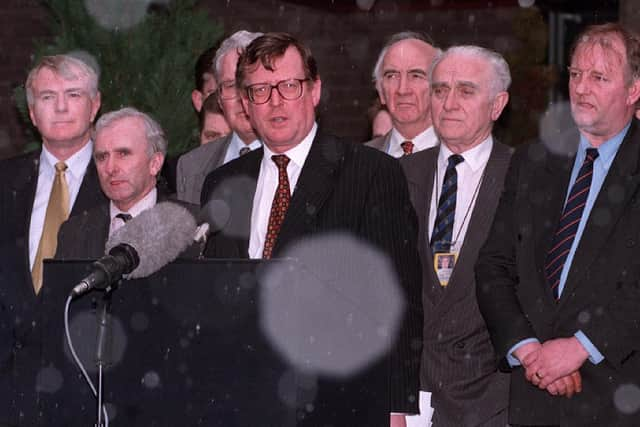Alex Kane: ‘Dreary steeples’ is what we do best — and worst


The DUP SF ‘ourselves together’ deal (with Paisley and McGuinness) was built on pure electoral self-interest and was the complete reversal of what I’d voted for in 1998: when, in a rare moment of optimism, I dared to hope the emergence of new voices, vehicles and thinking would allow NI to become a different place, a better place.
A place where political business would prove easier and old barriers would be toppled.
Advertisement
Hide AdAdvertisement
Hide AdWarning bells had been rung as early as July 1998, when the Assembly election didn’t produce a comfortable majority for the UUP, SDLP and Alliance (51%), the parties most committed to the spirit and possibilities within the GFA. By 2007 their collective vote had fallen to 35%, while the DUP and SF climbed to 56% and a majority of MLAs (64).


In other words, in less than a decade all we had done was take the electoral equivalent of Doc Brown’s DeLorean and gone forward to the past.
I wasn’t pleased with the 2007 outcome: nevertheless it was the democratic choice of a majority to put polar opposites, with competing and contradictory agendas, at the heart of the Executive.
So it didn’t come as any surprise when we endured a series of stop-start crises over the next decade, culminating in a three-year hiatus from 2017-20. Where we are with the rebooted Executive is anyone’s guess, but the tone-dead mood music and tin-eared exchanges would suggest a genuine rapprochement is as likely as a cure for my baldness.
Advertisement
Hide AdAdvertisement
Hide AdWhat does surprise me, though, in this latest crisis, is the DUP/SF spat over the integrity of the original agreement. And it surprises me because the DUP campaigned against it (and has never fully endorsed it since), while SF took almost a month to formally endorse it, but only on the basis, ‘it is not a settlement (but) marks the beginning of a transitional period towards Irish reunification’.
So the pretence they’re now trying to protect an agreement which was meant to champion the interests of everyone in NI is just self-deluding nonsense.
It’s not going to get better, even if there is a half-way acceptable settlement to the protocol crisis. As I’ve noted in previous columns we are now in permanent numbers-game territory between unionism and nationalism. The only thing which would make a difference would be the displacement of the DUP/SF axis by a UUP/SDLP/Alliance axis – but I don’t see that happening, even if the Alliance ‘surge’ continued in the Assembly election due in May 2022.
Unionism is focused on three priorities for that election: retaining the keys to the first minister’s office (albeit for psychological rather than political reasons); clawing back the unionist majority lost in 2017 (which will require winning six extra seats, probably on the back of some sort of electoral ‘understanding’); and increasing the margin between the overall unionist versus nationalist vote (hoping to reduce the ongoing clamour for a border poll).
Advertisement
Hide AdAdvertisement
Hide AdNationalism, on the other hand, particularly SF, is hoping for the precise opposite: finally having one of their own in the first minister’s office (again for psychological reasons); ensuring unionists don’t win six more seats (which seems a big ask for unionism anyway); and widening the gap between unionism and everyone else (because it makes the border poll campaign easier to promote).
Alliance, meanwhile, will be doing its best to avoid getting trapped in what may become a truly epic battle between unionism and nationalism.
Most of the elements of this struggle predate – by some margin – the Brexit/protocol impasse: so we would still be in this numbers-game and lack of genuine power-sharing dystopia even if the Brexit result and consequences hadn’t shifted the dynamics in 2016. Because no matter what happens elsewhere, or what other elements may bend the everyday political dynamics, we will always return to the ‘dreary steeples’ and comfortable, well-rehearsed constitutional collisions. It’s what we do best and it’s what we do worst.
There hasn’t, I think, been a moment in my lifetime – I was born 16 months before the IRA began their 1956-62 campaign – when we haven’t been dealing with the constitutional collisions. No other issues or referendum decisions will be allowed to distract us from that reality. Everything comes back to partition: and I’m pretty sure a united Ireland wouldn’t end the collisions, either.
Advertisement
Hide AdAdvertisement
Hide AdLet me end on a tangent. I’m regularly asked why I won’t acknowledge the ‘best of both worlds’ opportunities supposedly provided by the protocol? Well, for a start, the ‘other’ world is one in which NI is in one political/trading/economic/constitutional jurisdiction while GB is in another: which means NI would have ‘benefits’ not available to those of our fellow citizens in GB.
Superficially attractive, maybe, yet for many unionists (a considerable majority, I suspect) the existing protocol undermines the relationship between NI and GB citizenship; damages the constitutional integrity of the United Kingdom; and would, if it remained in place, change the nature of both the question and the debate in the event of a border poll.
My fears probably mirror the fears of nationalists who believed a hard land border would damage their sense of identity and broader citizenship. I acknowledged their fears.
I find it disappointing they cannot understand my fears about what the protocol might do to my sense of identity and citizenship.
——— ———
A message from the Editor:
Advertisement
Hide AdAdvertisement
Hide AdThank you for reading this story on our website. While I have your attention, I also have an important request to make of you.
With the coronavirus lockdown having a major impact on many of our advertisers — and consequently the revenue we receive — we are more reliant than ever on you taking out a digital subscription.
Subscribe to newsletter.co.uk and enjoy unlimited access to the best Northern Ireland and UK news and information online and on our app. With a digital subscription, you can read more than 5 articles, see fewer ads, enjoy faster load times, and get access to exclusive newsletters and content. Visit https://www.newsletter.co.uk/subscriptions now to sign up.
Our journalism costs money and we rely on advertising, print and digital revenues to help to support them. By supporting us, we are able to support you in providing trusted, fact-checked content for this website.
Alistair Bushe
Editor